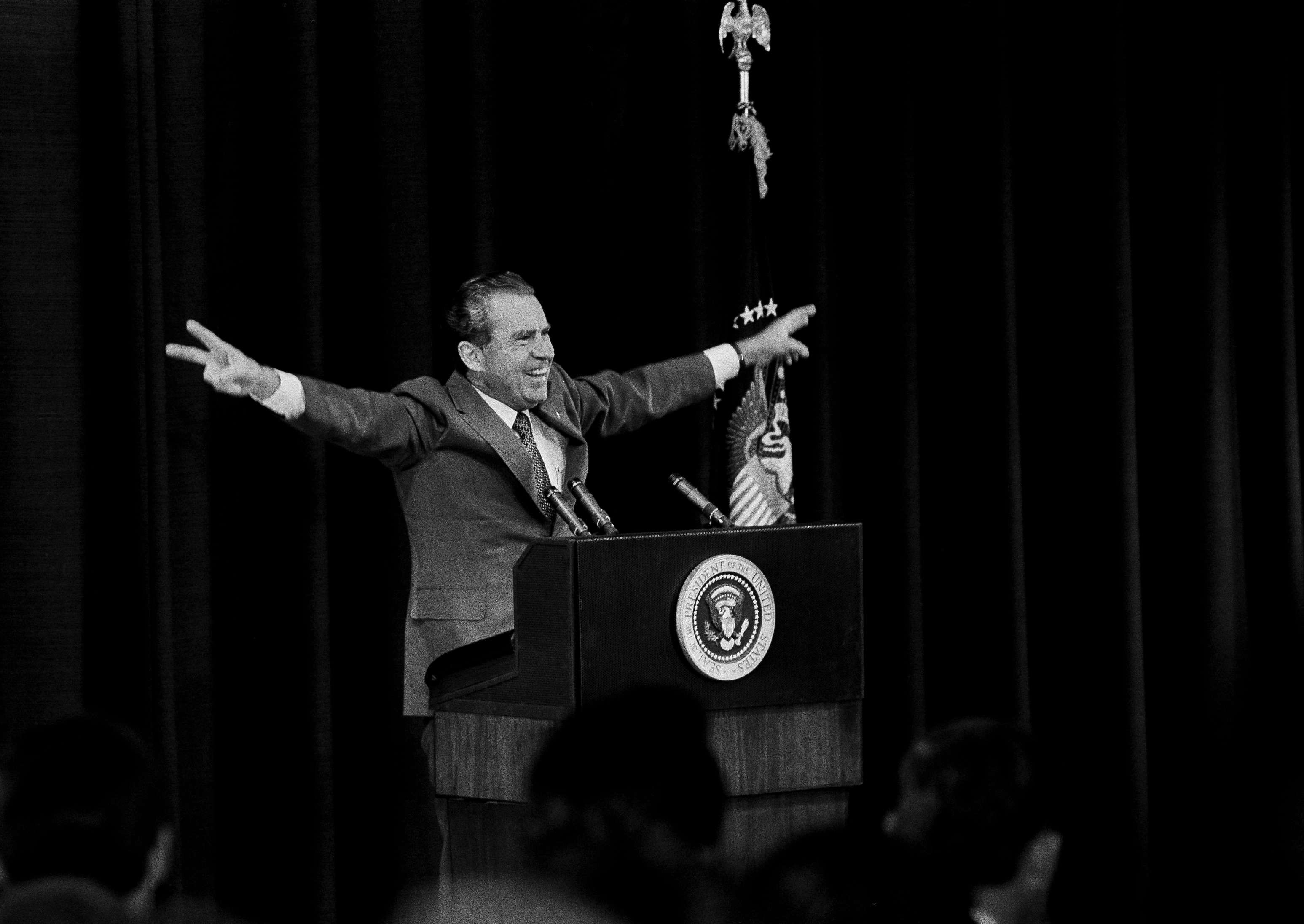The GOP isn't the party of Reagan. It's the party of Nixon.
The Nixon renaissance is upon us


A free daily email with the biggest news stories of the day – and the best features from TheWeek.com
You are now subscribed
Your newsletter sign-up was successful
The Richard Nixon renaissance is upon us. And it's a comeback every bit as remarkable as Nixon's return from the political wilderness to win the White House in 1968.
Late last month, Bob Dole wrote an essay arguing that "Washington could use a man like Nixon again." This week, Pat Buchanan publishes a second memoir of his time with the 37th president, Nixon's White House Wars. But the real Nixon revival isn't in print. It's in the Oval Office.
President Trump is easily the most Nixonian figure to inhabit the White House since Nixon himself. And under Trump, the Republicans are again becoming Nixon's party. Look around you: The long idealized party of Reagan, this is not.
The Week
Escape your echo chamber. Get the facts behind the news, plus analysis from multiple perspectives.

Sign up for The Week's Free Newsletters
From our morning news briefing to a weekly Good News Newsletter, get the best of The Week delivered directly to your inbox.
From our morning news briefing to a weekly Good News Newsletter, get the best of The Week delivered directly to your inbox.
To understand the Republican Party of the last half-century, it's helpful to draw a distinction between what's "conservative" and what's "right-wing." Nixon, like Trump, was right-wing but not conservative — that is, neither of them cared a whit for ideological purity as a matter of principle. Trump, like Nixon, is no believer in small-government dogma. Nixon's opening to China scandalized the conservatives of his time much as Trump's "America First" language shocked the keepers of conservatism's foreign-policy orthodoxy last year.
Over time, conservatism has been reduced to a checklist, a series of boxes to be ticked off on the right side of issues like gun control, gay marriage, abortion, taxes, deficits, and foreign policy. It lends itself to scorecards: The truest conservative is the one who comes closest to 100 percent. Nixon and Trump wouldn't be close. That's why so many old-guard conservative institutions opposed Trump in 2016, and it's why Nixon drew a token primary challenge from the former head of the American Conservative Union, John Ashbrook, in 1972.
But just because Nixon and Trump can't be called conservatives doesn't mean they're liberals or progressives. And each proved more popular with Republican voters than true-blue conservatives did just a few years before. Compare Nixon's victories in 1968 and 1972 to Barry Goldwater's landslide defeat in 1964, or Trump's 2016 victory to Mitt Romney and Paul Ryan's failure in 2012.
Here's the problem: That Nixon magic works in elections, but it doesn't apply to governing. And therein lies the tragedy.
A free daily email with the biggest news stories of the day – and the best features from TheWeek.com
Bob Dole calls Nixon a pragmatist, but that omits the obvious: Nixon may not have been an ideologue, but he was hardly a bland technocrat, just as Trump certainly is not. Nixon and Trump are "right-wing" in a visceral, emotional sense, rather than "conservative" in an intellectual sense. They won their elections by defining "us" and "them" — "them" being radicals, criminals, and great numbers of those who for one reason or another aren't part of what Nixon called the Silent Majority. (Today it is still a majority in a majority of states — which is why Trump is president — but it's not a majority in the county as whole.)
Now, it's important to acknowledge that Ronald Reagan was not the conservative purist of Republican legend. He had a protectionist streak, on display when he defended Harley-Davidson against Japanese competition. He wasn't always a sunny optimist — as governor of California, he earned his spurs with the right by cracking down on Vietnam-era campus protests. The 1980 Reagan campaign deployed many of the polarizing techniques Nixon had used: not a Southern strategy but a broader ethnic strategy, thought through in detail by Kevin Phillips in the late 1960s.
Reagan became the archetype of Republican success because he was both a conservative and a right-winger. Ideological elites could idolize him, while right-wing voters saw him as a man on their side. In the post-Reagan era, conservative Republicans have tended to fail in presidential politics because they persuade themselves that ideological orthodoxy is enough by itself, without a gut appeal to the right — including the right-wing sentiment that resides deep down inside many centrists, and even within some on the left.
Right-wing feeling can't take the place of policy, however. This is one source of the Republican Party's current angst. Its wonks, like Paul Ryan, can't speak to the hearts of the party faithful. Yet the leaders who can, like Trump, have only broad policy themes (immigration, anti-globalization, "America First," etc.) without any program for government. Dole was not entirely wrong about Nixon — a right-winger can be a pragmatist. But Nixon is a poor model for policy in almost any arena. Inflation ran wild under his administration; the country was unraveling socially; and instead of getting out of Vietnam quickly, Nixon expanded the war to neighboring countries. The opening to China was indeed a masterstroke of diplomacy, one that helped end the Cold War and set the stage for today's world order. Yet diplomacy so far appears to be the area where Trump is least likely to follow Nixon.
He would be well advised to do so, however, even in the teeth of conservative opposition. Reagan also faced criticism from ideological conservatives for his parlays with Gorbachev, yet those proved to be a strategic triumph. Trump wants to be known as a man who can make deals. That used to be a Republican specialty.
The myth of the Reagan party is well and truly busted. But the reality of Reagan is one to which Republicans can still return — not as a checklist or cookbook full of ideological recipes, but as a creative example of how the right and conservatism can be balanced, and at the best of times, transcended. As for Nixon, both as practitioner and subject, he remains a fascinating study for political psychology. But he's not the example of successful practice in office that the country so dearly needs.
Daniel McCarthy is director of the Novak Journalism Fellowship Program at the Fund for American Studies, the editor of Modern Age, and a columnist at The Spectator. His freelance journalism has appeared in a variety of publications in the U.S. and internationally, including the New York Times, the Daily Telegraph, The National Interest, and Reason.
-
 6 of the world’s most accessible destinations
6 of the world’s most accessible destinationsThe Week Recommends Experience all of Berlin, Singapore and Sydney
-
 How the FCC’s ‘equal time’ rule works
How the FCC’s ‘equal time’ rule worksIn the Spotlight The law is at the heart of the Colbert-CBS conflict
-
 What is the endgame in the DHS shutdown?
What is the endgame in the DHS shutdown?Today’s Big Question Democrats want to rein in ICE’s immigration crackdown
-
 The billionaires’ wealth tax: a catastrophe for California?
The billionaires’ wealth tax: a catastrophe for California?Talking Point Peter Thiel and Larry Page preparing to change state residency
-
 Bari Weiss’ ‘60 Minutes’ scandal is about more than one report
Bari Weiss’ ‘60 Minutes’ scandal is about more than one reportIN THE SPOTLIGHT By blocking an approved segment on a controversial prison holding US deportees in El Salvador, the editor-in-chief of CBS News has become the main story
-
 Has Zohran Mamdani shown the Democrats how to win again?
Has Zohran Mamdani shown the Democrats how to win again?Today’s Big Question New York City mayoral election touted as victory for left-wing populists but moderate centrist wins elsewhere present more complex path for Democratic Party
-
 Millions turn out for anti-Trump ‘No Kings’ rallies
Millions turn out for anti-Trump ‘No Kings’ ralliesSpeed Read An estimated 7 million people participated, 2 million more than at the first ‘No Kings’ protest in June
-
 Ghislaine Maxwell: angling for a Trump pardon
Ghislaine Maxwell: angling for a Trump pardonTalking Point Convicted sex trafficker's testimony could shed new light on president's links to Jeffrey Epstein
-
 The last words and final moments of 40 presidents
The last words and final moments of 40 presidentsThe Explainer Some are eloquent quotes worthy of the holders of the highest office in the nation, and others... aren't
-
 The JFK files: the truth at last?
The JFK files: the truth at last?In The Spotlight More than 64,000 previously classified documents relating the 1963 assassination of John F. Kennedy have been released by the Trump administration
-
 'Seriously, not literally': how should the world take Donald Trump?
'Seriously, not literally': how should the world take Donald Trump?Today's big question White House rhetoric and reality look likely to become increasingly blurred
